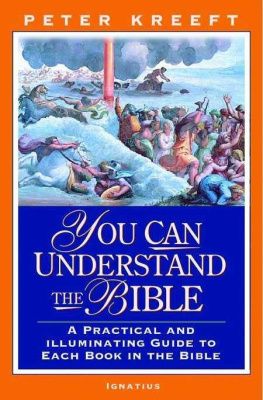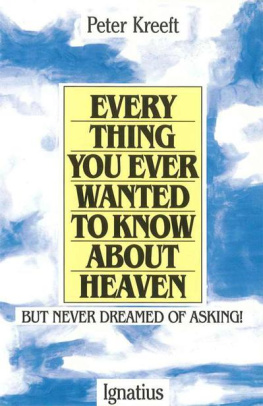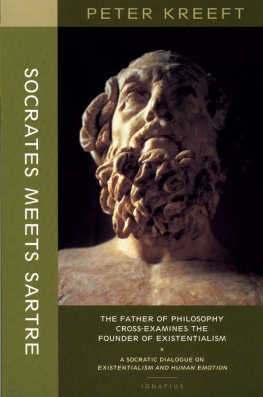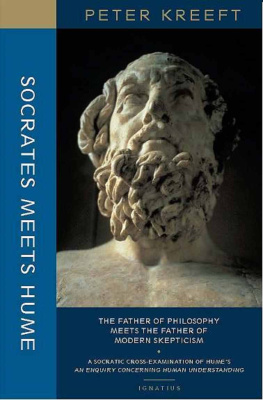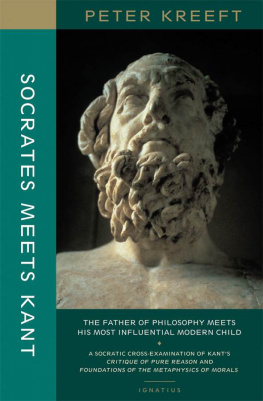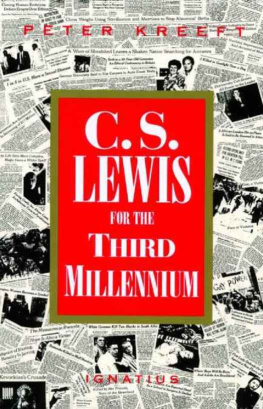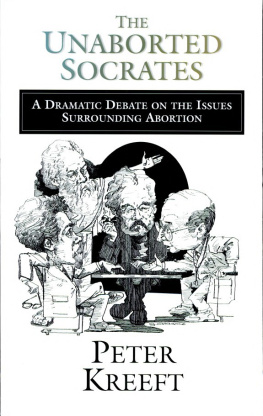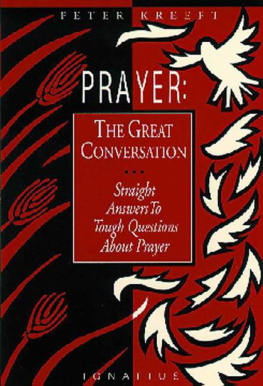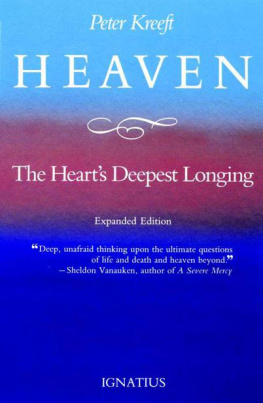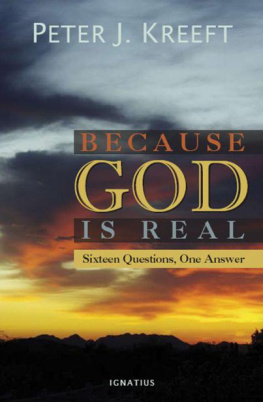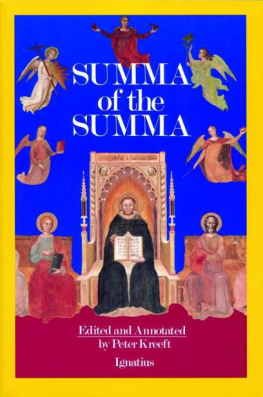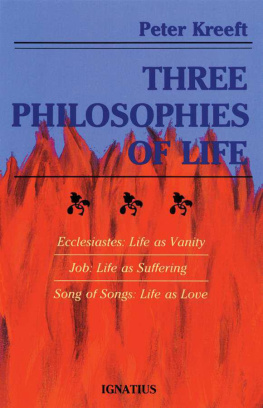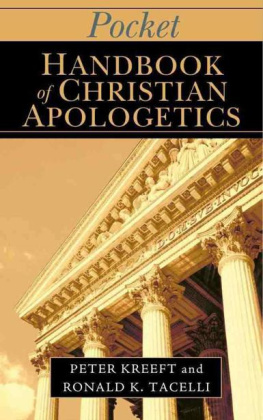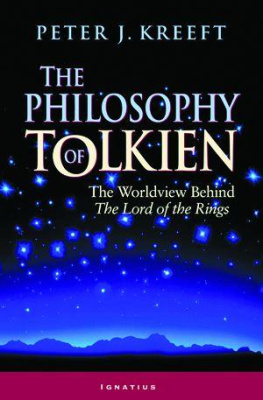Peter Kreeft - Between Heaven and Hell
Here you can read online Peter Kreeft - Between Heaven and Hell full text of the book (entire story) in english for free. Download pdf and epub, get meaning, cover and reviews about this ebook. publisher: InterVarsity Press, genre: Religion. Description of the work, (preface) as well as reviews are available. Best literature library LitArk.com created for fans of good reading and offers a wide selection of genres:
Romance novel
Science fiction
Adventure
Detective
Science
History
Home and family
Prose
Art
Politics
Computer
Non-fiction
Religion
Business
Children
Humor
Choose a favorite category and find really read worthwhile books. Enjoy immersion in the world of imagination, feel the emotions of the characters or learn something new for yourself, make an fascinating discovery.

- Book:Between Heaven and Hell
- Author:
- Publisher:InterVarsity Press
- Genre:
- Rating:5 / 5
- Favourites:Add to favourites
- Your mark:
- 100
- 1
- 2
- 3
- 4
- 5
Between Heaven and Hell: summary, description and annotation
We offer to read an annotation, description, summary or preface (depends on what the author of the book "Between Heaven and Hell" wrote himself). If you haven't found the necessary information about the book — write in the comments, we will try to find it.
Peter Kreeft: author's other books
Who wrote Between Heaven and Hell? Find out the surname, the name of the author of the book and a list of all author's works by series.
Between Heaven and Hell — read online for free the complete book (whole text) full work
Below is the text of the book, divided by pages. System saving the place of the last page read, allows you to conveniently read the book "Between Heaven and Hell" online for free, without having to search again every time where you left off. Put a bookmark, and you can go to the page where you finished reading at any time.
Font size:
Interval:
Bookmark:
Outline to Between Heaven and Hell
The following is meant to be an outline of the logical structure of the argument. The running sidebars in the text also aid the reader in announcing new topics.
This book can be seen either as a confrontation among three worldviews: Christian theism (Lewis), Eastern pantheism (Huxley) and modern Western humanism (Kennedy), or as a defense of the central, unique claim of Christianity (that Jesus Christ is God incarnate) against both modern Western secular objections and ancient Eastern religious objections.
I. Lewis vs. Kennedy
A. Kennedys objections (note Lewiss replies to each one)
1. new Christianity vs. old Christianity
2. Christian values vs. Christ
3. Jesus as man become God vs. Jesus as God become man
4. Objection to miracles and the supernatural
5. Objection to (and misunderstanding of) authority
6. Objection to black-and-white thinking
7. Objection to objective truth
8. Objection to proofs in religion
B. The argument: four ways to put the same basic argument
1. Jesus is aut deus aut homo malus (either God or a bad man).
He is not a bad man.
Therefore he is God.
Proof of the first premise: A mere man who claims to be God is a bad man, not a good man. He is either a liar (if he doesnt believe his claim) or a lunatic (if he does).
Thus Jesus is either Lord, Liar or Lunatic.
2. Sages (the wise) are trustable.
Jesus is a sage.
Therefore Jesus is trustable.
And trustable people tell the truth, especially about themselves.
Therefore Jesus tells the truth, especially about himself.
But Jesus says he is God.
Therefore it is true that he is God.
3. How can we classify Jesus?
Sages (wise, loving and creative): | Non-sages: | |
All the people who claim to be God (the God of the Bible): | Jesus only | the insane: the divinity complex |
All the people who do not: | Socrates, Buddha, Moses, Lao-Tzu, Confucius, Muhammad, Solomon, etc. | 99.99999% of all humans |
Reasons for classifying Jesus as a sage:
a. practical wisdom (prajna), insight into the human heart and character
b. practical love, altruism, compassion (karuna), selflessness, charity
c. creativity, unpredictability, interestingness, multidimensionality, unclassifiability
Lunatics have exactly the opposite three characteristics: platitudinous, egotistic and boring
4. What are all the possibilities about Jesus?
a. He didnt ever claim to be God as the Gospels say: Jesus is a MYTH
b. He did claim to be God.
i. By God he meant Brahman (the God of Hinduism): Jesus is a GURU
ii. By God he meant YHWH (the God of Judaism)
1. The claim is false
a. He knew it was false: Jesus is a LIAR
b. He didnt know it was false: Jesus is a LUNATIC
2. The claim is true: Jesus is the LORD
II. Lewis vs. Huxley
A. First objection: Jesus never claimed to be God; the texts are not to be trusted.
Lewiss answers:
1. There is much textual evidence for the Jesus of the Gospels and none against it; no evidence for any earlier, original, merely human Jesus, and no evidence for a later dating of the texts that claim divinity or miracles.
2. There is no motivation for the invention of the lie of a divine Jesus; those who taught it gained nothing by it and lost everything.
3. There is not enough time to have a legend of a divine Jesus arise and be believed, for eyewitnesses of the real Jesus would still be alive to contradict the new legend of Jesus.
4. Christianity is not like any other myth.
a. If it is a lie, it is the biggest lie ever told.
b. The style of the Gospels is realistic eyewitness description, not myth (compare real mythic writings); if it is not true, the apostles invented the modern literary genre of realistic fantasy eighteen centuries ago.
5. If Jesus did not claim to be God, the liar or lunatic argument can be applied to whoever invented the legendary claim of the divine Jesus:
a. If they believed that Jesus really did claim to be God when in fact he never did claim that, then they were very stupid. Not likely for Jews to confuse God with a man!
b. If they knew Jesus didnt really claim to be God, they were the greatest liars in historyand to what purpose? What advantage? Martyrdom does not prove truth, but it proves sincerity.
B. Second objection: Jesus may have claimed to be God, and in fact was God, but so are all of us. Jesus was a Hindu-type guru, a pantheistic mystic. Jesus was the guru to the Jews, but both his friends and his enemies failed to understand his true, inner, mystical, esoteric meaning, fastening instead onto his external, literal, exoteric, public words.
Lewiss answers:
1. Christianity, like Judaism, is an exoteric, public, open religion, not an esoteric one.
2. Jesus taught theism, not pantheism. He was a Jew, not a Hindu.
3. If he tried to teach the so-called perennial philosophy of pantheism, he was the least successful teacher of it in history, for he explicitly contradicted it on at least six points:
a. God is personal ( I am ), not impersonal.
b. God is the transcendent Creator, other and distinct from nature. Nature is neither God nor illusion, as it is in pantheism.
c. God is knowable by divine revelation in visible deeds and written words. Religion is Gods search for man, not just mans search for God.
d. God is good, not evil and not beyond good and evil. He has a will and gave a law.
e. Jesus taught sin and salvation; that we do not have divine life by nature, but must receive it from God by grace.
f. Those who do not accept this gift by faith will not be saved; there is hell, because there is created free will.
Time: November 22, 1963
Place: Somewhere beyond death
Characters: C. S. Lewis, Theist
John F. Kennedy, Humanist
Aldous Huxley, Pantheist
Kennedy: Where the hell are we?
Lewis: You must be a Catholic!
Kennedy: You could tell by the accent, eh?
Lewis: Yes. I sayarent you President Kennedy? How did you get herewherever here is?
Kennedy: Ex-President, I think: I seem to have been assassinated. Who are you? Andto return to my first questionwhere the hell are we?
Lewis: Im C. S. Lewis. I just died too, and Im pretty sure youre wrong about the location. This place just feels too good to be hell. On the other hand, I didnt see any God, did you?
Kennedy: No.
Lewis: Then it cant be heaven either. I wonder whether were stuck in limbo.
Kennedy: Ugh! Do you really think so?
Lewis: Actually, I think it more likely that its purgatory, especially if we end up getting out of it and into heaven. I did a bit of speculating about such places as a writer, especially in The Great Divorce. I dont suppose youve read it? No... well
... But surely you should be familiar with such concepts if you were a Roman Catholic.
One world at a time?
Kennedy: Well... I was more of a modern Catholic; I never bothered about transcendental mysteries or mythology. I was too busy trying to take care of the world I lived in for escapist thinking. One world at a time, as Thoreau put it.
Lewis: You can see now that you were wrong, cant you?
Kennedy: What do you mean?
Lewis: Why, first that it isnt mythology. Its real. Wherever we are, here we are, large as life. And second, that the rule isnt one world at a time. Here we are in another world talking about our past life on earth. Thats two worlds at a time by my count. And while we were on earth we could think about this world too; thats also two worlds at a time, isnt it? Finally, its not escapism. In fact, not to have prepared for this journey while we were living on earth would have been escapism. Dont you agree?
Font size:
Interval:
Bookmark:
Similar books «Between Heaven and Hell»
Look at similar books to Between Heaven and Hell. We have selected literature similar in name and meaning in the hope of providing readers with more options to find new, interesting, not yet read works.
Discussion, reviews of the book Between Heaven and Hell and just readers' own opinions. Leave your comments, write what you think about the work, its meaning or the main characters. Specify what exactly you liked and what you didn't like, and why you think so.

